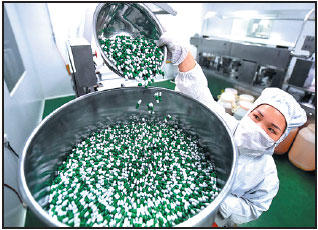TCM product naming regulations could cost manufacturers billions
Thousands of traditional Chinese medicine products face having their names changed due to a draft regulation issued last month by the China Food and Drug Administration, with the deadline for submissions on the guideline falling on Wednesday.
By May last year, about 1,000 people had left comments on the e-shopping site Amazon praising Mayinglong Musk Hemorrhoids Ointment Cream, describing it as "fantastic" and "like applying rose-colored ice cream to your bum".
However, it is one of thousands of products that falls foul of the draft naming rules, which state that TCM products should not be named after people, places or companies, or use superstitious or vulgar words.
Product names should also not include words that refer to pharmacology, anatomy, physiology, pathology or therapeutics, such as "anti-inflammatory" and "cancer", the draft guideline states.
Overstating, boastful and unrealistic words should also not be used in the names, such as ling (very effective), suxiao (quick acting) or yuzhi (made by emperor order).
The regulation would apply to both old and new TCM products, meaning the new policy would affect thousands of products. More than 2,000 products alone use the word ling, according to the administration's database.
Li Jin, quality director of Yunnan Baiyao Group - a TCM manufacturer based in Southwest China's Yunnan province - said that the company has seven TCM product series that use the company name, as well as tens of other products that use other soon-to-be-banned words.
"If Yunnan Baiyao had to change the name of its products, its brand and reputation established over the past 115 years would be damaged, and financial losses might exceed 10 billion yuan ($1.46 billion)," Li said.
Beijing Pharmaceutical Profession Association Vice-President Fu Lijia said that name changes would also require changes to packaging, introduction booklets and other related products, which would be extremely costly. Companies would then have to invest more in promoting their newly named products.
Liu Yue, an elementary school teacher in Yunnan's Kunming, said that people are familiar with names such as Yunnan Baiyao and Mayinglong ointment, adding that if the names of products changed, buyers might feel uneasy about purchasing them.
China has been regulating the names of TCM products since the 1990s to address issues such as different products having the same name.
An industry insider said some companies use words in product names which overstate the effects of the product or mislead buyers, especially senior citizens.
Fu said it is necessary to have regulations addressing the naming of TCM products. "In the past, names of TCM products were approved by local governments, with no universal standard."
Chen Qiguang, a research fellow at the Chinese Academy of Social Sciences, said that using names of people and places for TCM products is a common practice, which shows respect to their contributions.
Zheng Jin, head of Yunnan's TCM management bureau, said that the names of TCM products should be regulated, but that traditional brands should also be respected, adding that the new regulations should only apply to new TCM products.
guokai@chinadaily.com.cn
|
A worker handles traditional Chinese medicine at a pharmaceutical company's workshop in Bozhou, Anhui province.Liu Qinli / For China Daily |



















